These Are the 9 Healthiest Nuts You Can Eat, According to Experts

The healthiest nuts are great sources of fiber, antioxidants, and several nutrients like copper, manganese, and selenium—to name just a few. The crunchy snack is associated with a slew of health benefits, from better cognitive function to a decreased risk of heart disease and cancer, so it’s worth adding a handful now and then to your diet. But there are so many types to choose from, and they all boast slightly different nutritional perks. You may be wondering, what are the healthiest nuts to try?
Meet the Experts: Nichole Dandrea-Russert, M.S., R.D.N., author of The Vegan Athlete’s Nutrition Handbook, and sports dietitian Kelly Jones, M.S., R.D., C.S.S.D.
“All nuts are healthy,” says Nichole Dandrea-Russert., M.S., R.D.N., author of The Vegan Athlete’s Nutrition Handbook. “But depending on your need for certain nutrients or health benefits, some may rank higher than others.” For example, pistachios are great for plant-based eaters because they contain all nine essential amino acids, classifying them as a complete protein and relatively high-protein snack. Almonds are a good source of vitamin E, which is important for vision, brain, and skin health, while just one or two Brazil nuts can provide your entire daily recommendation for selenium.
We tapped registered dietitians to find nine nuts that stand out from a nutrition perspective. From both a taste and health POV, they’ll upgrade your next trail mix, baked good, or craving for crunch.
Pistachios
Pistachios are a great source of plant-based protein because they are one of the few plants that contain all nine essential amino acids in adequate quantities. This means that they are a complete protein, which some plant-based eaters may find difficult to fulfill in their diets. “Another benefit of pistachios is that they are a good source of melatonin, which promotes healthy sleep. Also, a pistachio’s signature green color comes from a variety of phytochemicals, lending to their antioxidant and anti-inflammatory properties,” says Dandrea-Russert. Sprinkle them on roasted veggies for a little crunch, use finely chopped pistachios as “breading” for fish fillets, or add them to yogurt with a drizzle of honey.
A 1-ounce (49 kernels) serving of pistachios contains:
Calories: 159
Fat: 12.8 grams
Protein: 5.73 grams
Fiber: 3 grams
Copper: 41% of the DV
Vitamin B6: 28% of the DV
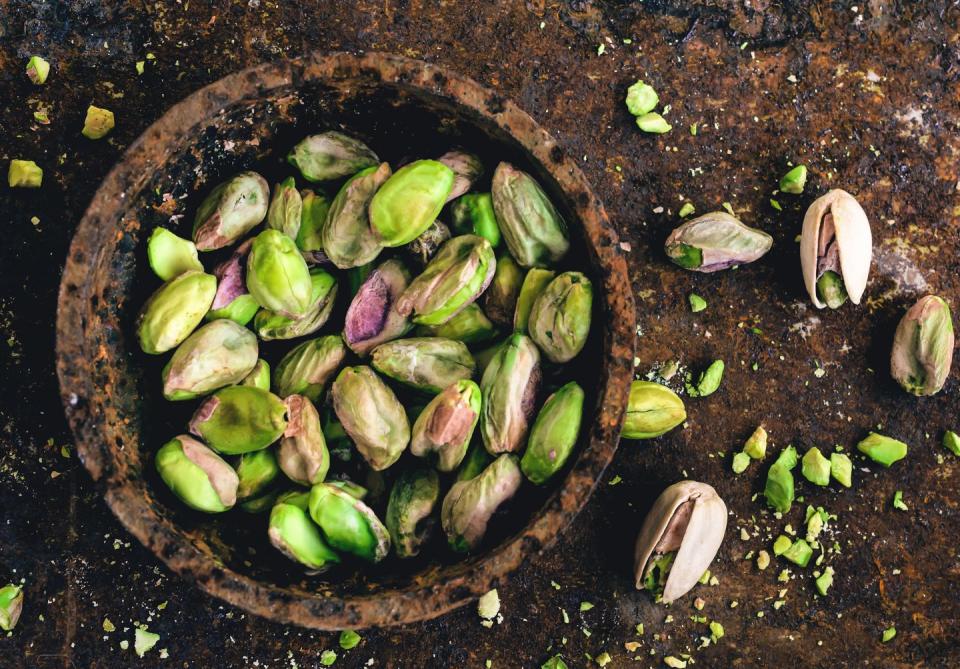
Walnuts
Walnuts might just be a good-mood food: Studies have found that walnuts promote cognitive health and mental health because of their antioxidant and anti-inflammatory properties, though more research is needed. Dandrea-Russert mentioned another study that looked at the mental health of stressed-out students and found that 56 g of walnuts a day (two oz) improved mood as well as gut microbe biodiversity. “Walnuts also provide a significant amount of omega-3—2.5 g in the form of ALA (alpha linoleic acid),” says sports dietitian Kelly Jones, M.S., R.D., C.S.S.D. She recommends storing them in your refrigerator or freezer, as the omega-3 content may make them oxidize and spoil more easily than some other nuts.
A 1-ounce (14 halves) serving of walnuts contains:
Calories: 185
Fat: 18.5 grams
Protein: 4.31 grams
Fiber: 1.9 grams
Manganese: 53% of the DV
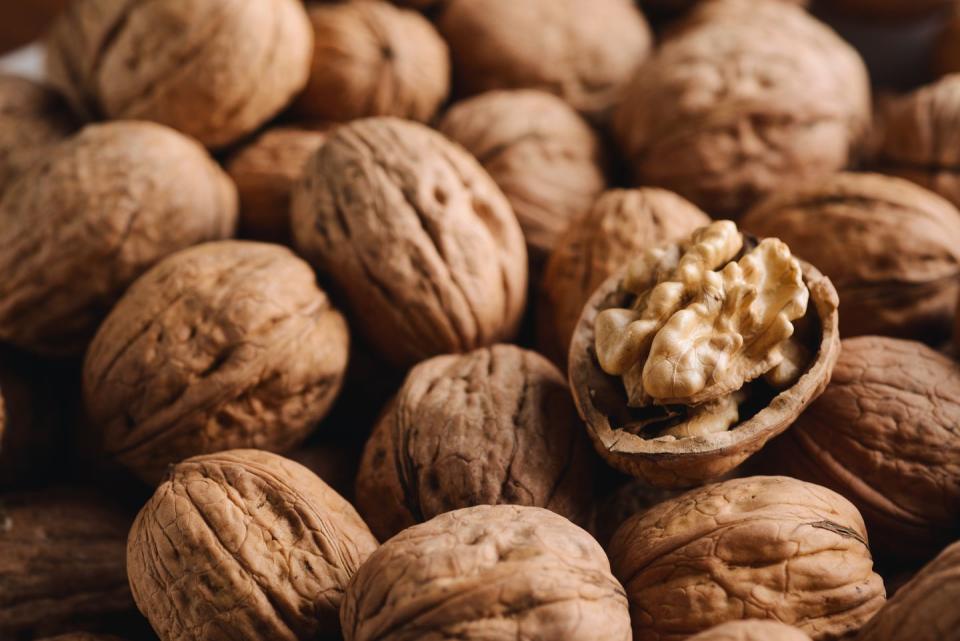
Brazil Nuts
Just one of these super-size nuts, among Jones’ top nut recommendations, can offer more than your daily value for selenium, an essential component that plays a key role in reproduction, thyroid health, and the prevention of cell damage and infections. Just be aware that the tolerable upper intake level of selenium is about 400 mcg and Brazil nuts contain 68–91 mcg per nut. Try not to exceed three nuts per day (because they are so large, 1–2 is plenty satisfying). The nuts contain other beneficial micronutrients like zinc, copper, and magnesium, as well as phytonutrients that act as antioxidants. Enjoy them finely chopped on top of yogurt or blended into a smoothie.
A 1-ounce (6 kernels) serving of Brazil nuts contains:
Calories: 187
Fat: 19 grams
Protein: 4.05 grams
Fiber: 2.13 grams
Selenium: 989% of the DV
Copper: 55% of the DV
Magnesium: 25% of the DV
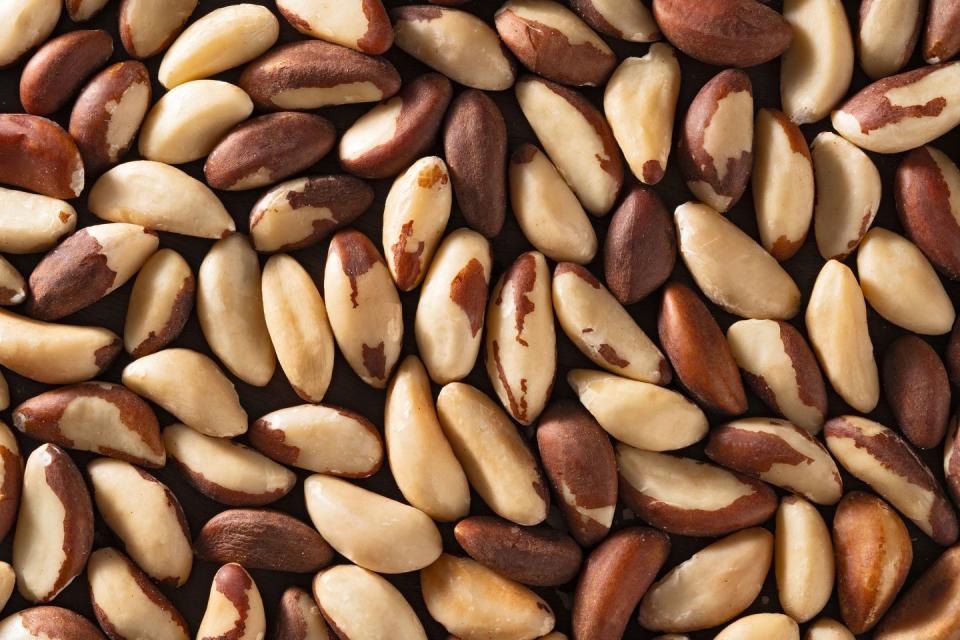
Almonds
Thanks to their healthy monounsaturated fat content, almonds are a heart-friendly addition to your diet. They’re also a rich source of fiber, calcium, magnesium, and vitamin E. Dandrea-Russert suggests eating whole almonds with the skin on: “Research shows that whole almonds may support gut health through their prebiotic properties. Bonus that many of the phytochemicals are housed in the fibrous almond skin.” Almond flour is a delicious, nutty addition to baked goods, sliced and toasted almonds make a prime salad topper, and chopped almonds are great on oatmeal.
A 1-ounce (23 kernels) serving of almonds contains:
Calories: 164
Fat: 14.1 grams
Protein: 6.01 grams
Fiber: 3.54 grams
Vitamin E: 48% of the DV
Manganese: 27% of the DV
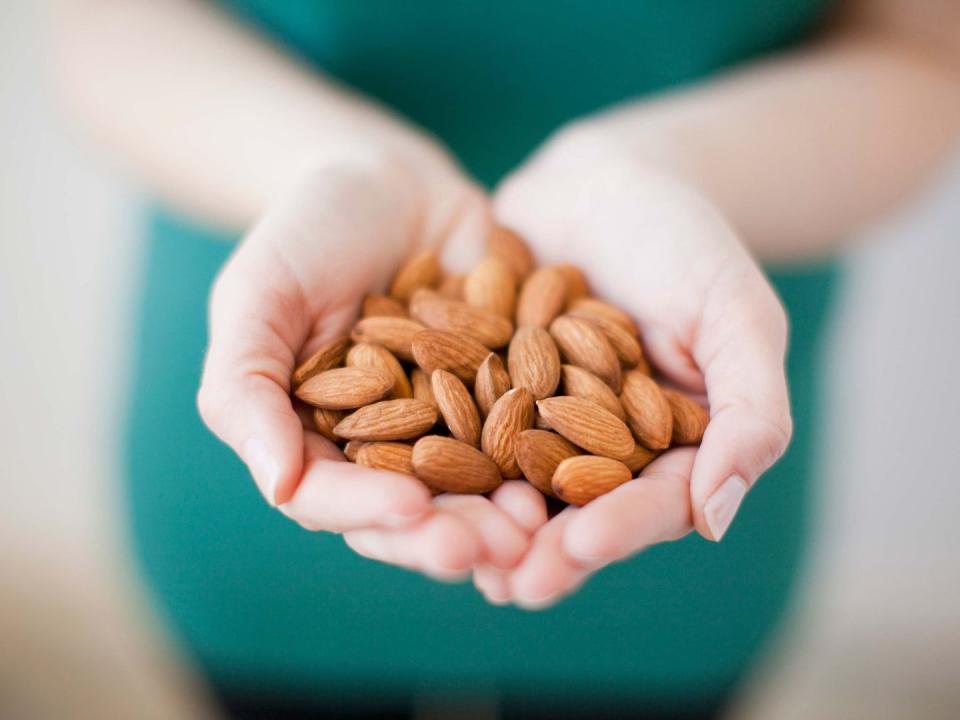
Peanuts
Though technically a legume, peanuts are often consumed like nuts and offer many of the same nutritional benefits, like healthy fats and protein. In fact, peanuts boast more protein than most nuts, clocking in at over 7 g per 1-oz serving. (Almonds and pistachios have about 6 g of protein, cashews have about 5 g, and walnuts have 4 g in the same serving size). Enjoy peanuts sprinkled over a curry or stew, blended into energy bites, or add a dollop of peanut butter to your go-to pancake batter for a protein boost.
A 1-ounce (28-gram) serving of peanuts contains:
Calories: 160
Fat: 13.8 grams
Protein: 7.14 grams
Fiber: 2.41 grams
Manganese: 27% of the DV
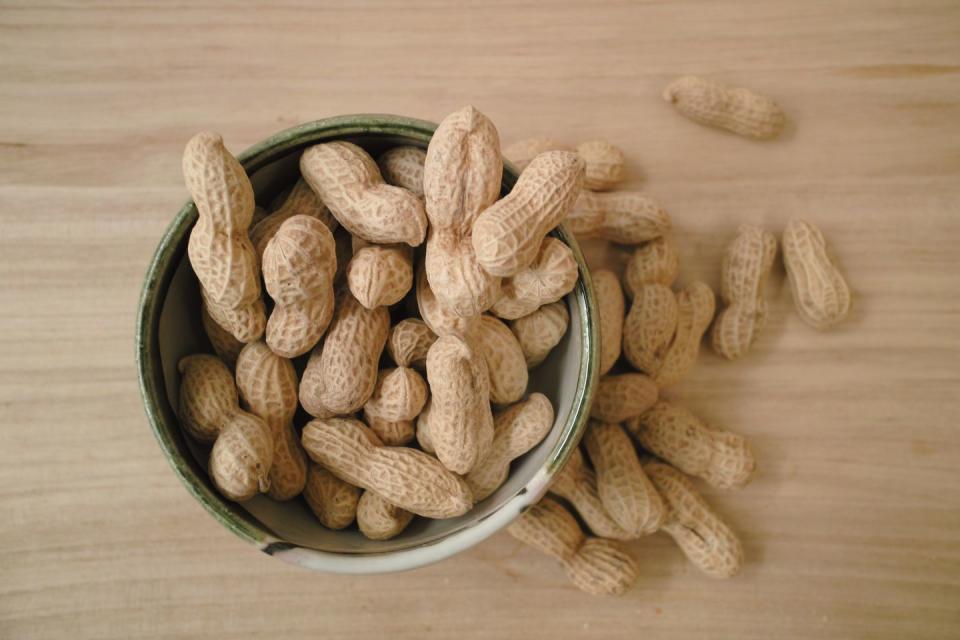
Cashews
Cashews contain a bundle of essential minerals like zinc, copper, magnesium, and manganese (key for energy production, immune support and bone health, among other functions). They’re also rich in leucine, the essential amino acid that triggers muscle synthesis. Incorporate them into stir-fries, roast them with a pinch of salt, or boil them with water and spices, then puree for a creamy start to a vegan pasta sauce. With a smooth, buttery texture, they make a tasty alternative for dairy.
A 1-ounce (28-gram) serving of cashews contains:
Calories: 157
Fat: 12.4 grams
Protein: 5.16 grams
Fiber: 0.94 grams
Copper: 69% of the DV
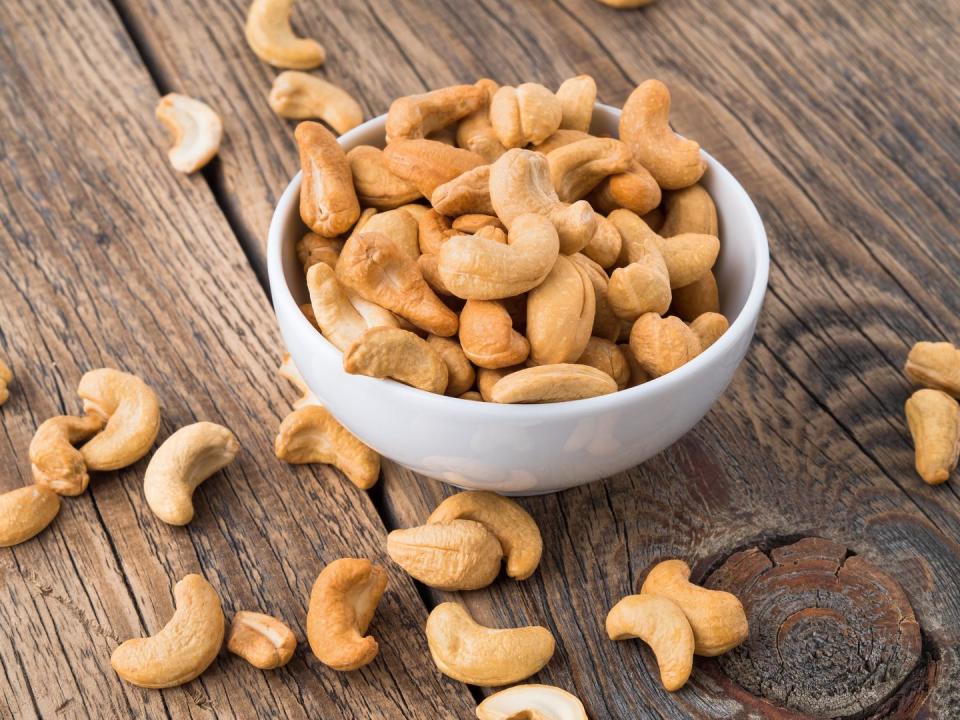
Hazelnuts
It’s no wonder hazelnuts are the perfect partner to chocolate: Mildly sweet and very rich, they practically scream “dessert.” The decadent morsels are also full of antioxidants, which protect the body from oxidative stress (an imbalance between molecules in your body that can lead to various diseases). Eating hazelnuts, especially with the skin where antioxidant activity is stronger, has been shown to reduce oxidative stress. But they’re not just for a post-dinner treat. Combine them with other nuts, bittersweet chocolate chips, and dried fruit for the ultimate trail mix that’s ideal for on-the-go snacking.
A 1-ounce (21 kernels) serving of hazelnuts contains:
Calories: 178
Fat: 17.2 grams
Protein: 4.25 grams
Fiber: 2.75 grams
Manganese: 87% of the DV

Pecans
Slightly sweet with a rich, buttery texture, pecans are a key ingredient in many desserts (hello, pie). While these treats can be loaded with sugar, pecans themselves are not. Like many other nuts, pecans are a great source of several vitamins and nutrients that can help lower blood pressure, making them a heart-healthy snack. In particular, pecans are rich in copper, an important mineral for the nervous and immune systems, and thiamine, a B vitamin key for energy production. Pecans are also rich in zinc, another key nutrient for immune function.
A 1-ounce (19 halves) serving of pecans contains:
Calories: 196
Fat: 20.4 grams
Protein: 2.6 grams
Fiber: 2.72 grams
Copper: 38% of the DV
Thiamine: 17% of the DV
Zinc: 16% of the DV

Macadamia Nuts
Macadamia nuts are high in calories, several nutrients, and beneficial plant compounds, making them a satisfying, hunger-busting snack. They’re also higher in fat than many other nuts on this list, but it is a type of monounsaturated fat that may lower your LDL (bad) cholesterol and improve heart health. Macadamia nuts are rich in antioxidants and boast more flavonoids than many other tree nuts. Flavonoids are healthy chemical compounds that may help protect your body from toxins, reducing inflammation and protecting against disease. They also contain tocotrienols (a form of vitamin E), which have powerful cholesterol-lowering, anti-cancer, and neuroprotective properties.
A 1-ounce (10-12 kernels) serving of macadamia nuts contains:
Calories: 204
Fat: 21.5 grams
Protein: 2.24 grams
Fiber: 2.44 grams
Manganese: 65% of the DV
Thiamine: 31% of the DV
Copper: 24% of the DV

What is the most nutritious way to eat nuts?
Pair nuts with fresh fruit like apples, pears, or berries, recommends Jones: “This helps balance the snack so that in addition to fat, protein, and fiber, you’ll get energy that maintains adequate blood sugar levels along with more volume to enhance feelings of fullness.” On the go? Swap in dried fruit instead for a shelf-stable, portable snack. If you’re looking for a higher-protein snack, pair a handful of nuts with a hard boiled egg along with veggies and hummus, advises Jones.

What is the healthiest nut to eat?
For the biggest nutritional value for your buck, you can’t beat peanuts and pistachios. They are among the highest in protein, lowest in fat, and lowest in calories compared to every other nut on this list. Plus, they have a variety of vitamins, minerals, and beneficial plant compounds, many of which have antioxidant properties. But if you have specific health goals, like boosting immune function, improving brain health, or aiming to lose weight, you should look into the nut that suits your needs.

What is the unhealthiest nut to eat?
The registered dietitians we spoke to maintained that all nuts are healthy. However, you may want to enjoy them in moderation if you have calorie-related health goals because they are a calorically dense food. Macadamia nuts have the highest amount, about 200 calories per one-ounce serving, followed by pecans and Brazil nuts.

Which nuts are least fattening?
Cashews contain the least amount of total fat per one-ounce serving, followed by pistachios, peanuts, and almonds. Although the fat in nuts is primarily monounsaturated fat, which can help lower “bad” cholesterol and maintain “good” cholesterol. That’s why nuts are an essential part of a heart-healthy diet.

You Might Also Like


